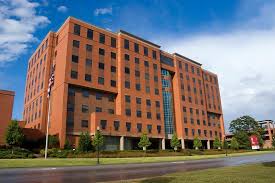Special to the
Opelika Observer
Because children perceive the world in a way that is much different from adults, they have specific needs when it comes to coping – especially when medical treatment, injury or illness is involved. In January 2018, East Alabama Medical Center partnered with Auburn University to bring a child life specialist to serve the needs of children who come to the Emergency Department and Pediatric Unit.
Child-life specialists are educated and clinically trained to provide emotional and psychosocial support to children who are going through stressful, uncertain and traumatic situations. Certified child-life specialists must have a minimum of a bachelor’s degree in human development and family studies. Each specialist must also complete 120 hours before applying for a 600-hour internship, which they must complete before they are able to take the certification exam.
Miranda Morrow, a certified child-life specialist, helps young patients at EAMC primarily through procedural support, preparation and medical play. Describing her role as halfway between a teacher and a nurse, Morrow has knowledge regarding medications, procedures and medical technology as well as how to communicate these things to a child based on his or her specific needs.
One of the common procedures that Morrow coaches children through is an IV insertion. Because children are very visual, and their primary language is play, Morrow uses medical play to demonstrate what an IV insertion would look like on a stuffed animal. Starting with the prep, Morrow helps them actively partake in each step so they feel in control of the situation and understand what to expect when their own procedure occurs.
“Miranda not only has helped us improve our pediatric care, but has also been essential in making connections in the community as well as nationwide to help us get donations to further this program,” said EAMC nursing unit manager Forrest Bonner.
For children who may have a longer stay, Morrow uses things like sticker charts to promote positive coping and behavior. Her facilitation of toy donations to the Emergency Department has helped occupy the time of children who have lengthy stays as well as improve their overall experience in an unfamiliar setting.
“Over the past year, we have been working diligently to make EAMC more child friendly and family oriented by enhancing our Child Life program,” Morrow said. “We are very fortunate to be able to offer these services to our pediatric patients as typically only larger university hospitals have a child life specialist.”
Morrow has also helped teach nurses developmentally appropriate terms and best practices to use when treating a child to help the procedure and overall hospital stay feel less threatening for younger patients.
“We aim to make the experience as easy as possible not only for the child, but for their family,” Morrow said. “We want the children and their families to know they have a voice, and that we are their biggest advocates.”
Child-life specialists have only been around for approximately 35 years, and there are nearly 5,000 nationwide who are certified. Having a child-life specialist at EAMC is not only benefiting patients, but is benefitting students in the College of Human Sciences who are interested in becoming a child life specialist and want hands-on clinical experience in the field.
“Prior to having a child life specialist, there were many techniques that we did not have implemented here that we have now seen improve the emotional care we provide to children who come through our doors,” Bonner said. “Miranda has influenced the culture of our emergency department and we are seeing our pediatric patients and their families thrive because of it.”

